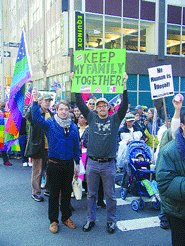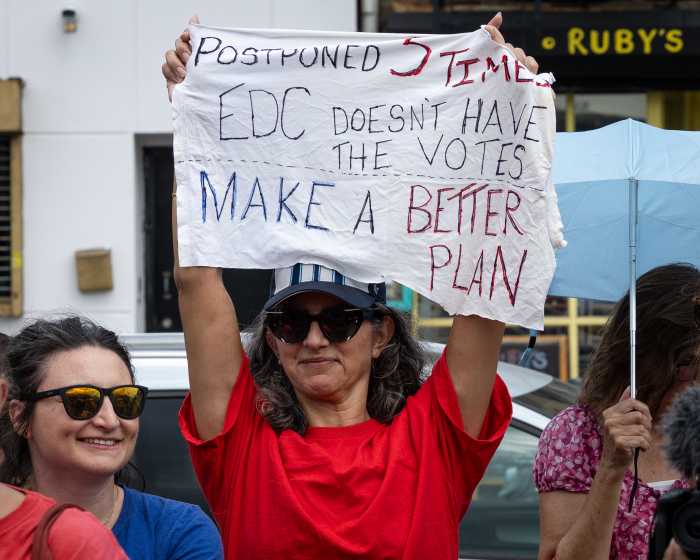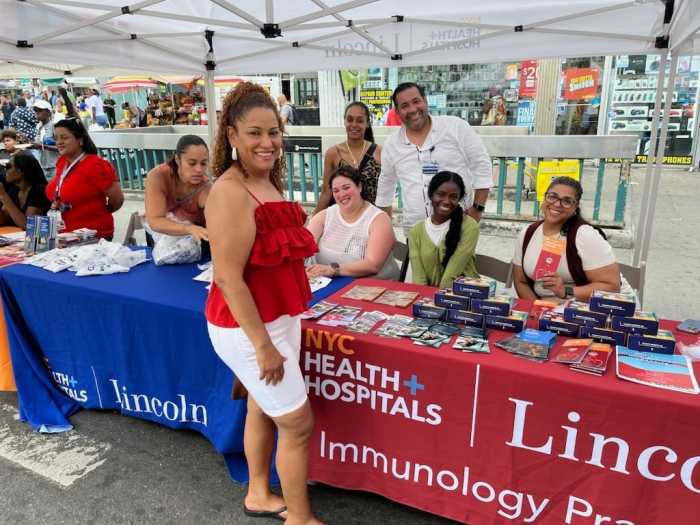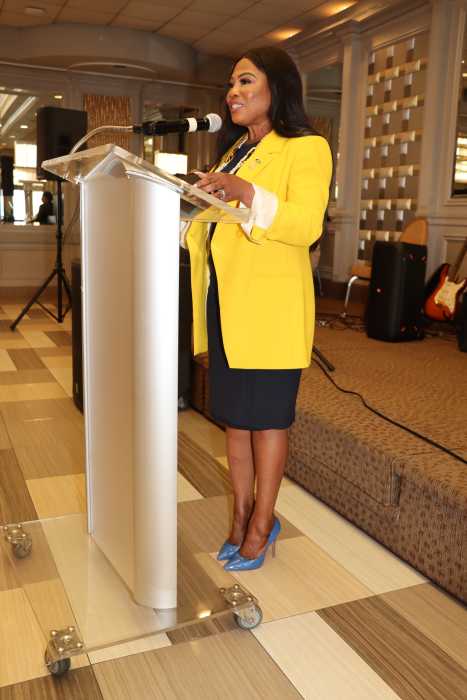LGBT New Yorkers Join Tens of Thousands of Immigration Reform Advocates
Immigration reform is not a new issue for Pradeep Singla. An Indian-born immigration lawyer, he came to the United States in 1993 and has been working as an activist pressing for basic reform for the past eight years.
“There are LGBT people detained all over the country,” he told Gay City News. “That is a very vulnerable population, who face abuse by other detainees and by staff who are not sensitive to the needs of those who are HIV-positive and other needs based on gender identity and sexual orientation.”
Singla was among a crowd numbering hundreds—including Latinos, East Asian, Irish, and Indian Americans, and African immigrants—who gathered near the temporary PATH station at the World Trade Center site early Monday afternoon to join the massive immigration rights march on City Hall. Estimates of the total crowd who turned out have ranged from 70,000 up to 150,000 and it could not be determined how many LGBT marchers joined the PATH station contingent as the overall crowds swelled or how many marched alongside straight allies within their ethnic communities.
A group of LGBT Koreans gathered with their fellow Korean-Americans for the march. Andres Duque, coordinator of Mano a Mano, an umbrella group of LGBT Latino organizations, explained that many of his colleagues arrived at the PATH station after the bulk of the LGBT marchers had stepped off, and that participants from both the Hispanic AIDS Forum and the Latino Commission on AIDS entered the march from different entry points.
On a beautiful early spring day, the ever-growing crowd was upbeat and exuberant, despite the deadly serious issues the march sought to highlight.
Representatives of a half dozen LGBT groups enunciated a series of queer-specific concerns, but were also at pains to emphasize their support for a thorough overhaul of the nation’s immigration policies. Advocates cited the fact that HIV-positive immigrants are typically ineligible for permanent residency, and can arbitrarily be denied entry altogether; that American citizens in same-sex relationships with an immigrant are denied the right to have their partners naturalized as straights are allowed to do through marriage; and that asylum claims based on persecution because of sexual orientation, gender identity and expression, and HIV status during the Bush administration have been treated in an increasingly hostile manner.
“Obviously we have a special concern about the lesbian and gay family issues within immigration,” explained Desma Holcomb, an organizer at the Empire State Pride Agenda, the state’s LGBT rights lobbying group. But, she added, “Just as the Pride Agenda supports reproductive rights, we also support immigration rights and other social justice issues.”
Miriam Yeung, public policy director at the LGBT Community Center, is an immigrant who came to America from Hong Kong, and she echoed the Pride Agenda’s view and explained it as well in personal terms.
“The Center’s presence here marks support for the immigrant rights community. And the Center certainly knows that the LGBT liberation movement and the immigrant rights movement are connected in many ways and we want to work in solidarity and in coalition,” she said. “I myself as a lesbian immigrant came to this country when I was two years old and have a very particular first-person narrative about how these issues intersect.”
Singla and others explained some of the complexities that LGBT immigrants face within the broad categories of asylum, HIV status, and Americans not being able to provide a route to citizenship for their same-sex partners from outside the U.S. Since the Clinton administration, immigration officials have included gay people, the transgendered, and those living with HIV among the “social groups” that can apply for political asylum based on a history or well-founded fear of persecution and violence. Yet, in line with extensive reporting that Arthur S. Leonard has done for this newspaper, Singla noted, “Recently, the government has actually made it far more difficult to obtain asylum in the U.S.”
He hastened to add, however, that this is not strictly a post-9/11 phenomenon. Referring to the increased attention that immigrant detention has received in the past four years, he said, “Actually this is a myth. The detention was happening before 9/11 but after 9/11 it has been pushed to the forefront of the media.” He conceded, however, that “the numbers have increased considerably.”
As for the recent focus, spearheaded by West Side Democratic Congressman Jerrold Nadler, to advance a policy that would allow gay and lesbian Americans to have their immigrant partners naturalized, Singla said, “that may not even help many people because they do not have American citizen partners, they have HIV and have been here for a long, long time.”
Brendan Fay, an Irish immigrant who arrived in the U.S. in 1984 and won a lottery among other Irish Americans for permanent residency status in 1993, talked about how the bar on HIV-positive immigrants has affected some of those from his homeland.
“I know many friends who were denied status because of their HIV,” he said. “That is still ongoing. I have many friends who are painters, electricians, construction workers, office workers, who are contributing to the life of the community, but because of their HIV status they are unable to return to Ireland,” out of fear they will not be allowed to re-enter the U.S. afterward.
Fay talked about the need for mainstream gay groups to focus greater attention on immigrant rights, but Singla emphasized the benefits of queer immigrants taking the lead on the issue.
“We face extreme homophobia in our own communities and at the same time we face racism in the gay community,” he said. “So it’s like we are at this unique intersection, we are such an isolated, invisible group we don’t simply have any voice.”
For five years, Singla worked for Immigration Equality, originally founded as the Lesbian and Gay Immigration Rights Task Force, the leading national LGBT group working to reform immigration law, mitigate the fallout from current problems in the law, and press specific appeals for asylum. Three years ago, however, Singla founded the Queer Immigrant Rights Project, a volunteer-run group which aims to “provide a safe space for LGBT and HIV-positive immigrants allowing them to network, assist one another, share information and resources, and advocate on issues affecting the queer immigrant community.”
“The last two weeks have been a lesson for the gay community that oppressed people have come out on the streets and we have fought our own fight. It’s not been our white allies” Singla said of the huge turnouts of immigrants in rallies recently in Los Angeles, Dallas, and Chicago. “Of course allies are important, but I think this is a message really that the gay community needs to understand that we need to have the immigrant leadership grow, and we must support groups like the Queer Immigrant Rights Project or the Audre Lorde Project,” the Brooklyn-based community center for queer people of color.
Andrew, a Brooklyn-born white man who resides in Chelsea with his partner of three years, a Mexican immigrant who was at work Monday and could not attend the march, said, “I would like first of all for Congress to recognize the contributions that all immigrant workers are making in the U.S. and to find ways for all immigrants who are here working to be here legally.”
Andrew, who would not give his last name, said that his partner has relied in part of renewing his tourist visa from time to time and also on the couple living temporarily in other countries.
“So far so good,” Andrew said, “but it’s a very precarious situation.”
Asked whether talk about an immigration reform package in the Senate, though stalled, encouraged him, Andrew responded, “The people out on the street here are what gives me the optimism.”
Congressman Nadler, who marched with the LGBT contingent on Monday, offered a brighter assessment of the efforts on Capitol Hill. “Noting that “the Republicans are very much in disarray,” he said the acknowledgement by some in the GOP that a path to legalization needs to be put in place for the more than 11 million undocumented immigrants—in return for more stringent border security—represents progress.
“It remains to be seen whether when we come back from the two-week recess we can put together a halfway reasonable bill. I haven’t given up on that yet,” Nadler said. “I do think that given the progress we’re making, assuming a decent election result in November which looks pretty good right now, if we don’t get a decent bill now, we should have a very good shot next year.”
He said his major quibble with the compromise that fell apart last week is that it gives a less sure path to permanent residency for immigrants in the U.S. for less than five years, and very poor prospects for anyone here for less than two years. Asked whether a Democratic Congress in 2007 would bring an end to the HIV-positive immigrant ban and move the bill enabling gays to keep their immigrant partners in this country, Nadler would only say, “I don’t know if they will pass but we can at least get a hearing and a vote.”
Trishala Deb, an immigrant from India who came to the U.S. 25 years ago and works for the Audre Lorde Project, was decidedly more critical than Nalder about the talk of compromise in Washington.
“In terms of a compromise, one thing that we’ve taken a position on is against all the gold card and the guest worker programs,” she said. “It gives especially low-wage workers a right to be in this country only up until the moment when the government says they don’t have it anymore… We feel like could be the end of the green card, the end of any permanent status for immigrants which would really be extremely dangerous.”
gaycitynews.com































